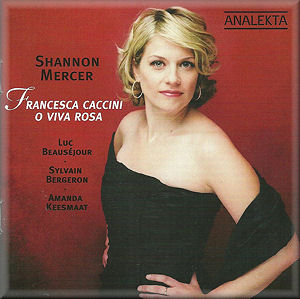 |
 |
| 

alternatively
CD: MDT
AmazonUK
AmazonUS
Sound
Samples & Downloads
|
Francesca
CACCINI (1587-c.1640)
O vive rose [3:04]
Non sò se quel sorriso [3:29]
Rendi alle mie speranze il verde [4:05]
Io veggio i campi verdeggiar fecondi [3:30]
Se muove [3:15]
Dolce Maria [3:01]
Lasciatemi [5:54]
S’io men vo [2:23]
Regina celi [2:23]
Dov’io credea le mie speranze vere [4:22]
Ch’Amor sia nudo [2:35]
O chiome belle [2:44]
Io mi distruggo [4:41]
Te lucis ante terminum [2:57]
La pastorella [3:14]
Su le piume de’ venti trionfator [3:40]
Fresche aurette [1:32]
Giulio CACCINI (1551-1618)
‘Quattro Canzoni di mio padre’ [4:09]
 Shannon Mercer (soprano), Luc Beauséjour (harpsichord, organ), Sylvain
Bergeron (guitar, theorbo), Amanda Keesmaat (cello)
Shannon Mercer (soprano), Luc Beauséjour (harpsichord, organ), Sylvain
Bergeron (guitar, theorbo), Amanda Keesmaat (cello)
rec. 2-4 November 2009, Église Saint-Augustin de Mirabel, Quebec
Texts and Translations of Italian (but not Latin) songs available
online.
 ANALEKTA AN 2 9966 [61:54]
ANALEKTA AN 2 9966 [61:54]
|
|
|
Interest in Francesca Caccini and her music has deservedly
grown a good deal in recent years, in terms of scholarship,
public performances and recordings alike. 2009 saw the publication
of a major monograph, Francesca Caccini at the Medici Court:
Music and the Circulation of Power, by Suzanne G. Cusick.
Gradually, perception of Francesca Caccini has, as it were,
liberated her from the shadow of her father Giulio, a process
Cusick brings, for the moment, to a fulfilment, providing a
fascinating account of Caccini’s life in a male-dominated world.
She recounts how Caccini negotiated the particular demands which
those circumstances placed upon her, as well describing her
considerable achievement as a composer in her own right. Caccini’s
fame as a singer has sometimes distracted eyes and ears from
her work as a composer. This new CD joins others which have
already made available some of her music and it deserves a place
of honour in their company.
Shannon Mercer’s recital - which is interspersed with some purely
instrumental items - draws on both secular and religious songs
from Caccini’s Il primo libro delle musiche, published
in 1618 and dedicated to Cardinal Charles de Medici. The collection
is made up of 32 solo songs and four duets for soprano and bass;
it contained what was at the time the most sizeable collection
of solo songs by a single composer yet to be published. Mercer
proves herself to be a very accomplished interpreter of these
songs, subtle in expression without ever being merely mannered,
her voice having both agility and an attractive weight. Ornamentation
feels unforced and apt, the breath-control - Caccini writes
some very long phrases - admirable. The instrumental work of
Beauséjour, Bergeron and Keesmaat is exemplary, and the four
combine so well that one is loath to describe their musical
relationship simply in terms of singer and ‘accompanists’.
Caccini’s writing is constantly inventive and she is not frightened
to use dissonance and unexpected harmonies expressively. In,
for example, ‘Dolce Maria’, a Latin madrigal in praise of the
Virgin as Our Lady of Consolation, the relationship of musical
phrase to verbal text is perfectly calculated - though it sounds
too ‘natural’ for one to be entirely comfortable about the use
of a concept like calculation here. The simplicity of the continuo
beautiful complements the melismatic passages in the vocal writing.
In song after song Caccini’s respect for the phrase patterns
of Italian speech is married to a thoroughly musical attention
to melody and harmony. Amongst the most memorable pieces are
‘Regina Celi’ which includes some ravishing alleluias. ‘O vive
rose’ is sung with splendid vivacity and agility. ‘Lasciatemi
qui solo’ is a sustained lament, exquisitely sung by Mercer,
in which it isn’t hard to hear affinities with Monteverdi and
which serves to remind one that Caccini was the first recorded
woman to write operas. In ‘S’io men vò, morirò’, the troubled
emotions are very well realised in this performance. There is,
though, something unavoidably invidious in selecting individual
tracks for praise – the whole is excellent.
The purely instrumental items are equally satisfying: Amanda
Keesmaat is foregrounded in a moving performance of ‘Io veggio
i campi verdeggiar fecondi’ and Luc Luc Beauséjour plays ‘Te
lucis ante terminum’ with pleasing dignity - and without the
slightest inappropriate ponderousness. Caccini père makes
an appearance in Sylvain Bergeron’s performance, on baroque
guitar, of his own arrangement of four brief songs, under the
whimsical title of ‘Quattro Canzoni di mio padre’, as if the
arrangement were by Francesca herself! And very pleasant they
are too.
Since the 1960s (at least) feminist scholarship and criticism
have led to the rediscovery or rehabilitation of many female
poets, painters and composers. It isn’t unreasonable to think
that in some cases those rediscovered have been as overpraised
as they were previously unjustly neglected. The music of Francesca
Caccini, however, is one of the most significant treasures to
whose worth we have thus been alerted. She was surely a composer
on a par, at least, with her father, and is one of the most
interesting figures of her age – a contention for which this
present CD provides eloquent evidence.
Glyn Pursglove
|
|
|












